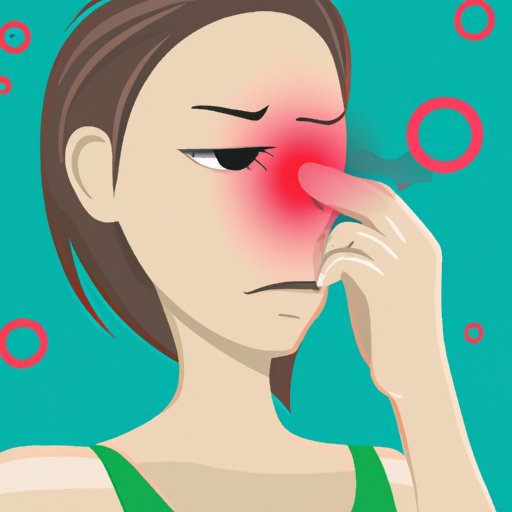
Introduction
If you’ve ever had a sinus infection, you know how miserable it can make you feel. Sinus infections, also known as sinusitis, occur when the tissues lining your sinuses become inflamed. There are different types of sinusitis, but the symptoms are largely the same. In this article, we’ll explore the ten tell-tale signs you may have a sinus infection, how to identify a sinus infection, the most common symptoms, and how to treat them. We’ll also discuss when to see a doctor and why it’s essential to recognize the symptoms of sinus infection.
10 Tell-Tale Signs You May Have a Sinus Infection
1. Nasal congestion: One of the most common symptoms of sinusitis is blocked nasal passages. You may find it difficult to breathe through your nose.
2. Headaches: Sinus infections often cause headaches that are associated with pressure and pain in the forehead, cheeks, and eyes.
3. Postnasal drip: This happens when excess mucus from the nose and sinuses drips down the back of the throat. It might cause a sore throat or coughing.
4. Facial pain or pressure: The inflammation in your sinuses can cause pain or pressure in your face, especially around your nose, forehead, and eyes.
5. Earache: The same inflammation that causes sinus pain can affect the ears, leading to discomfort or pain.
6. Loss of smell and taste: The inflammation of the nasal tissues can affect your sense of smell and also your sense of taste.
7. Dizziness: When sinusitis causes significant pressure on our inner ear, it can sometimes lead to vertigo or dizziness.
8. Toothache: The roots of your upper teeth are close to your sinuses. Sinusitis can cause pain in your teeth, even if there’s no issue with them.
9. Fatigue: Your immune system works overtime to fight off infection. This can make you feel tired and sluggish.
10. Fever: If your sinus infection leads to a bacterial infection, you may develop a fever.
Sinusitis Symptoms: How to Identify a Sinus Infection
If you’ve got a cold or allergies, you might experience similar symptoms to those of sinusitis. However, sinusitis typically lasts longer and is often accompanied by fever. Symptom duration is key to differentiating sinusitis from other sinus-related conditions.
The symptoms of sinusitis will depend on the type of sinusitis you have. Acute sinusitis lasts less than four weeks, and its symptoms might include pain and tenderness in the face, nasal congestion, and postnasal drip. Subacute sinusitis lasts between four and twelve weeks, and its symptoms might include nasal congestion, a loss of smell, and facial pain. Chronic sinusitis lasts over twelve weeks, and it involves symptoms that are milder but longer lasting.
The Most Common Symptoms of a Sinus Infection and How to Treat Them
If you think you have a sinus infection, here’s how you can treat the symptoms at home:
1. Nasal irrigation: nasal irrigation, using a saline solution made with boiled water, or other isotonic solutions such as sterile saline sprays or drops, can help you remove mucus and decrease inflammation.
2. Steam inhalation: Steam inhalation, such as taking a hot shower, can help you soothe clogged sinuses.
3. Over-the-counter medications: Over-the-counter medications, such as nasal decongestants, pain relievers, and antihistamines may help you manage your sinusitis symptoms.
4. Stay hydrated: Moisture can help break up congestion in your sinuses, so it’s important to stay hydrated by drinking plenty of water.
A Comprehensive Guide to Understanding the Symptoms of Sinus Infection
Sinusitis can cause symptoms beyond nasal congestion and pain. These uncommon symptoms may vary but are worth noting:
1. Bad breath or halitosis: A postnasal drip can result in bad breath or halitosis.
2. Coughing: A postnasal drip can result in coughing.
3. Irritability: Chronic sinusitis can cause irritability.
4. Sore throat: Postnasal drip can result in a sore throat.
5. Swollen nasal tissues: Swollen nasal tissues can result in breathing difficulties.
If these symptoms persist, it’s important to visit a doctor.
When to See a Doctor: Recognizing the Symptoms of Sinus Infection
If your sinusitis symptoms don’t get better, your doctor may recommend different treatments including antibiotics, steroid sprays, and surgery. If you experience vomiting, high fever, or vision changes, you should seek medical help promptly.
Sinus Infection Symptoms Explained: Everything You Need to Know
Sinusitis is a common illness, and its symptoms can vary from annoying nasal congestion to severe earaches or toothaches. Identifying any symptoms that you are experiencing is valuable in getting you back to breathing comfortably. Use the simple methods we discussed above and consider visiting a doctor if the symptoms continue.
Why It’s Important to Recognize the Symptoms of Sinus Infection: A Closer Look
Overall, it’s essential to treat sinusitis symptoms quickly, so they don’t affect your overall health negatively. Delays in treatment can make the illness worsen, and in extreme cases, could require surgery. Taking prompt action can relieve symptoms, lessen discomfort, and keep sinusitis from developing into a severe condition.




